Archive for July, 2020
-
Globe Life and Eagle Bank Beat Earnings
Eddy Elfenbein, July 22nd, 2020 at 4:16 pmToday was a very good day for our Buy List. We were up 1.09% today which was 0.52% better than the S&P 500.
The nice earnings reports certainly helped. Silgan Holdings (SLGN) gained 7.8% and Stepan (SCL) was up by 3.4%. Check Point Software (CHKP) had been up by 5% earlier today but it eventually closed down by 1.1%.
After the closing bell, Globe Life (GL) reported fiscal Q2 operating earnings of $1.65 per share. The beat expectations of $1.53 per share.
Here are some highlights:
• Net income as an ROE was 9.4% for the six months ended June 30, 2020. Net operating income as an ROE excluding net unrealized gains on fixed maturities was 13.6%.
• Life premiums increased over the year-ago quarter by 8% at the Direct to Consumer Division and 7% at the American Income Life Division.
• Health premiums increased over the year-ago quarter by 7% at the Family Heritage Division.
• Life net sales at the Direct to Consumer Division increased over the year-ago quarter by 43%.
• Health underwriting margin increased over the year-ago quarter by 7%.Also after the bell, Eagle Bancorp (EGBN) reported earnings of 90 cents per share. That beat expectations of 74 cents per share.
While the country at large experienced a very challenging environment in the second quarter of 2020 due to the COVID-19 pandemics extensive negative impacts to businesses and the economy in general, the banking industry faced significant related credit and interest rate challenges. In spite of these second quarter headwinds, we believe our Company has managed well, both in terms of our employee base staying healthy as well as staying in close contact with our many business relationships. As a result, we are pleased to report another quarter of overall favorable earnings, highlighted by continued growth in average loans and deposits, favorable operating leverage, and improved noninterest income, noted Susan G. Riel, President and Chief Executive Officer of Eagle Bancorp, Inc. Ms. Riel continued, The Companys assets ended the quarter at $9.8 billion, representing 13% growth over the second quarter of 2019. Second quarter 2020 earnings resulted in a return on average assets (ROAA) of 1.12%, return on average common equity (ROACE) of 9.84%, and a return on average tangible common equity (ROATCE) of 10.80%.
We have two more earnings reports tomorrow.
-
Five New Highs Today for the Buy List
Eddy Elfenbein, July 22nd, 2020 at 11:50 amSherwin-Williams (SHW), Silgan Holdings (SLGN), FactSet (FDS), Stepan (SCL) and Danaher (DHR) made new 52-week highs today.
A few other Buy List stocks like Ansys (ANSS), Trex (TREX), Moody’s (MCO) and RPM International (RPM) are close to new highs.
Ansys got five cents away.
-
Three Buy List Earnings this Morning
Eddy Elfenbein, July 22nd, 2020 at 8:58 amWe have five Buy List earnings reports due today and three came out before the opening bell.
Check Point Software (CHKP) said that earnings rose 15% to $1.58 per share. That beat expectations of $1.44 per share. Revenue rose 4% to $506 million. Wall Street had been expecting $488 million.
Stepan (SCL) reported Q2 adjusted net income of $1.65 per share. That’s up from $1.50 per share a year ago. Currency translation pinged them for 11 cents per share. Expectations were for $1.20 per share.
Silgan Holdings (SLGN) earned 85 cents per share for the second quarter. The beat expectations of 65 cents per share.
Globe Life (GL) and Eagle Bancorp (EGBN) will report later today.
-
Morning News: July 22, 2020
Eddy Elfenbein, July 22nd, 2020 at 7:05 amFroth Returns to China’s Stock Market, Echoing the 2015 Crisis
Africa Starts to Have Second Thoughts About That Chinese Money
Insiders Who Nailed Market Bottom Are Starting to Sell Stocks
Here’s What’s Behind the ‘Perfect Storm’ Sending Silver Prices Surging
How Tesla Defined A New Era For The Global Auto Industry
In Electric Car Market, It’s Tesla and a Jumbled Field of Also-Rans
How to Sell Books in 2020: Put Them Near the Toilet Paper
Can Remote Work Growth Offset Stalls In Microsoft’s One-Time Deals?
How Ben & Jerry’s Perfected the Delicate Recipe for Corporate Activism
Avoid Airline Stocks, Trader Says As United Airlines Reports $1.6 Billion Loss
Joshua Brown: There Goes the Dollar
Howard Lindzon: My Favorite Investing Book
Jeff Carter: Request for Information From FDIC
Nick Maggiulli: There is Nothing Wrong With a Traditional Career
Ben Carlson: Generational Wealth Inequality
Be sure to follow me on Twitter.
-
The Home-Run Stocks Wall Street Doesn’t Know About
Eddy Elfenbein, July 21st, 2020 at 8:33 amImagine there’s a stock that’s up more than 30-fold in the last 20 years and it’s not followed by a single Wall Street investment analyst.
This investment has crushed just about every hedge fund out there, yet Wall Street is completely unaware of it.
Worst of all, it’s stock in a company that’s known by many. In fact, it’s a favorite of people who work on Wall Street.
The stock I’m talking about is Nathan’s Famous (NATH).
That’s right, the hotdog stand. Nathan’s is not only a great New York institution; it’s been a big long-term winner for investors.
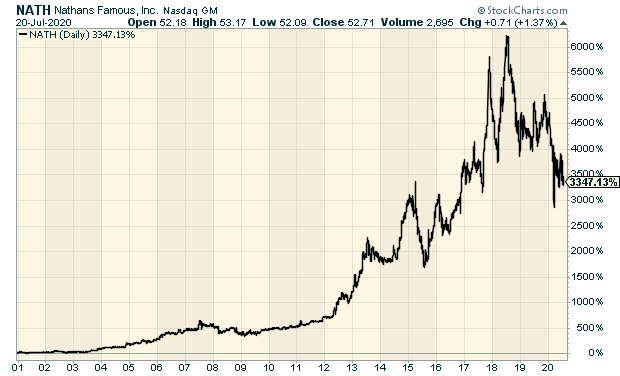
Nathan’s is what we call an “Orphan Stock.” That means that it has zero or near-zero analyst coverage.
I love Orphan Stocks. They’re a great place to find overlooked values. Some of the big-name stocks on Wall Street are followed by 20, 30, even 50 analysts. These stocks live in glass fishbowls, but that’s not the case with Nathan’s, which, despite its name, apparently isn’t nearly as famous as I thought.
There are lots of great Orphan Stocks. Ever heard of Atrion (ATRI)? Don’t worry. You’re not alone.
Atrion is a medical-products company based in Dallas. Even though it’s small ($1.2 billion market cap), Atrion is strong in some niche markets like soft-contact-lens disinfection cases. Do you wonder who makes valves for life vests? There’s a good chance it’s Atrion.
Twenty-two years ago, you could have picked up one share of ATRI for $7. Recently, the stock got up to $665 per share.
Now I’m going to ask you a very easy question: Guess how many firms on Wall Street cover Atrion? I’ll give you a hint. It’s the same as Nathan’s.
That’s right. Zero.
The S&P 500’s had a good run over the years and it looks like a flat line in comparison to ATRI.
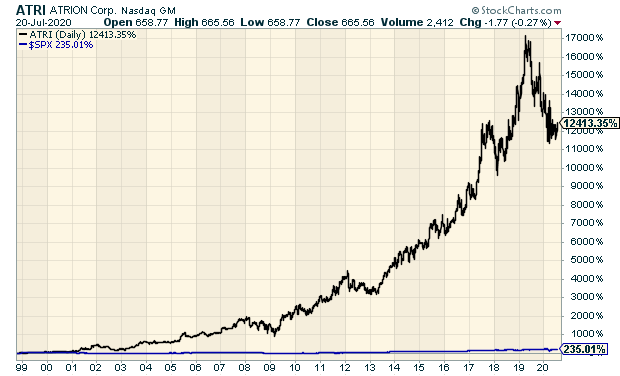
How can a stock rise so much for so long and no one on Wall Street has ever thought to start covering it? Part of the reason is they don’t bring Wall Street any investment banking business.
That’s more of a plus than a minus. It suggests the company hasn’t entered into any unwise mergers. Or taken on too much debt. Or been acquired at a poor price. Not needing a banker is hardly a bad thing.
Let’s also remember how hard the financial crises blew through Wall Street. The big houses simply don’t have the big research departments like they used to. The budgets have been cut back. As a result, there are lots of companies that get no analyst coverage.
Four years ago, Jason Zweig highlighted the best-performing stock of the last 30 years. Far from being a well-known large-cap tech stock, the big winner was Balchem (BCPC) of Wawayanda, NY. The company makes “flavorings, fumigating gases and nutritional additives for animal feed.”
Sexy!
From 1985 to 2015, Balchem gained over 107,000%. Zweig noted that Balchem didn’t attract a single major institutional holder until 1999. That was after it returned an average of 21.3% for the previous decade. Even today, Balchem is followed by a grand total of two analysts. Compare that with Facebook, which is followed by over 50.
Every earnings season, investors gather to see what companies have beaten expectations and what companies have fallen short. But for Nathan’s and other Orphan Stocks, there’s no “Street consensus” because no one follows them. For an investor, that’s another bonus. You don’t have to worry about the quarterly earnings game.
Consider an Orphan stock like Chase Corporation (CCF), which is a specialty-chemical company based in Westwood, MA. Chase is one of those Warren Buffett-style stocks. The only difference is that you have to move the decimal point over a few notches. Chase is a quiet firm that consistently generates strong cash flow. It’s a well-run cyclical, with gross margins typically around 35%. Best of all, Chase doesn’t carry a dime of long-term debt.
Over the last 25 years, Chase has gained nearly 6,000%. That’s enough to beat both Microsoft and Intel. Again, no one follows it.
These aren’t microcaps, either.
How about the wonderfully named U.S. Lime & Minerals (USLM)? Since 2003, it’s returned more than 30-fold (dividends included). Zero analyst coverage it. In 1990, Century Bancorp (CNBKA) hit a low of $1 per share. Today, it’s at $76 per share, and it’s paid dividends all along the way. Number of analysts. Zero.
Another benefit of investing in Orphan Stocks it that with fewer eyes watching a stock, there may be a better chance to finding a mispriced stock. I wouldn’t say the market is efficient, but the inefficiencies have a better chance of showing up where others aren’t looking for it.
Also, these businesses tend to fairly easy to understand. Orphans often don’t have arcane off-balance-sheet items or operating divisions around the world. A hobbyist-investor can invest an afternoon and read through a company’s SEC filings and be well-informed on the business.
If you have more questions, you can do something few investors think of: call the company and ask to speak to someone. Better-run companies are happy to speak with their investors. After all, the shareholders are the owners.
You’ll often hear that the type of value investing that Warren Buffett and Charlie Munger made their fortunes on is no longer possible in the world of mass data and Bloomberg terminals. That may be right in terms of amassing a multi-billion fortune, but there are plenty of companies operating well below Wall Street’s radar.
Here are a few examples of Wall Street Orphans
Miller Industries (MLR) of Ooltewah, Tennessee. Miller Industries makes and sells towing and recovery equipment. The company makes the wreckers used to move disabled vehicles.
They also make those multi-tier car carriers that you often see on the road. If a car or truck needs to be hauled out of something or hauled to somewhere, odds are Miller’s got a vehicle that can do it.
Miller Industries is a good example of a company with a strong “moat.” There are competitors, but it’s the dominant name in the business.
Since its low in 2000, MLR is up 8,000%. Zero analyst coverage.
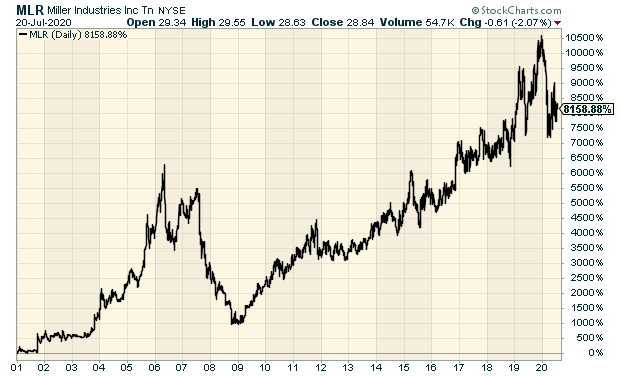
Simulations Plus (SLP) makes software that lets drug companies simulate tests of their products in the virtual world before using any human or animal test subjects.
This is a big cost-saver for drug companies. Simulations Plus helps streamline the R&D process by making it faster and more efficient. Not only is this cost-effective, but it also helps drug companies deal with time-consuming regulatory hurdles.
Earlier this month, Simulations reported that net revenues rose 23.8% and gross profit increased 26.5%. Two analysts follow it. It was recently added to the S&P SmallCap 600.
The Texas Pacific Land Trust (TPL) has a colorful history. It was born over 130 years ago when the Texas and Pacific Railway went bust. The aim of the T&P was to build a southern transcontinental train route. Despite the name, the T&P never made it to California.
The railway was left with a ton of land of a ton of debt. The trust was formed with 3.5 million acres of land that the railway owned. People who held the railway’s worthless bonds got shares of the new land trust. Some oil came along, the trust made money and everyone was happy. Eventually, the shares started trading on the NYSE in 1927. (On a technical point, Texas Pacific Land Trust is not a REIT. It’s a land trust.)
In 1995, you could have picked up a share for $3.50. Recently, TPL’s been trading at $585. One analyst follows it.
The Hingham Institution for Savings (HIFS) dates back to 1834. In 1990, the stock was going for just over $1 per share, adjusted for splits. Today it’s at $178. Hingham has consistently increased its dividend over the last 25 years. I love how this company treats it shareholders. Last year, Hingham paid out a special dividend of 60 cents per share on top of its regular dividend.
In the chart below, Hingham is the black line. The blue line is Berkshire Hathaway.
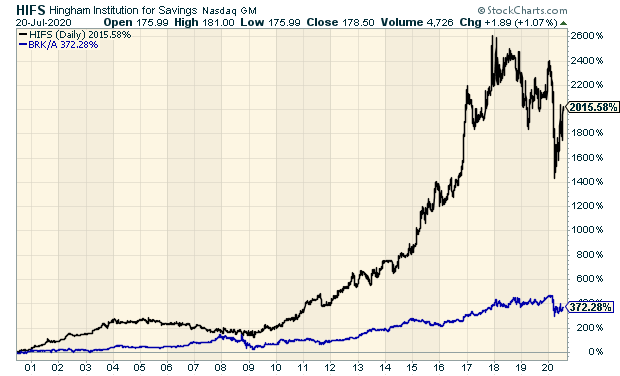
-
Morning News: July 21, 2020
Eddy Elfenbein, July 21st, 2020 at 7:07 amE.U. Adopts Groundbreaking Stimulus to Fight Coronavirus Recession
The Inside Story of How Europe Landed Its Massive Stimulus Plan
Coronavirus Threatens the Luster of Superstar Cities
‘Less Optimistic’ and ‘More Cautious’: Top C.E.O.s Fret as Virus Cases Rise
Global Presence An Advantage As U.S. Companies Brace for Second-Half Slump
Frackers Are in Crisis, Endangering America’s Energy Renaissance
Fed, Walmart Share The Push To #maskup
EBay Sells Classified Ad Unit for $9.2 Billion
Alibaba’s Ant Could Be Bigger Than Some Wall Street Banks — What You Need to Know About the Dual IPO
Concerts Aren’t Back. Livestreams Are Ubiquitous. Can They Do the Job?
Discount Grocer Aldi To Open More Than 70 Stores By End Of Year As Part Of National Expansion
Howard Lindzon: Momentum Monday – From Frothy To Constructive
Jeff Miller: Weighing the Week Ahead: What is Your Personal Downside Risk?
Ben Carlson: Mortgage Rates Are Insanely Low
Joshua Brown: How the S&P 500 Uncoupled From Your Local Economy, Spending By The Unemployed Led The Recovery & Will Tesla Be Added to the S&P 500?
Be sure to follow me on Twitter.
-
Quiet Monday for Stocks
Eddy Elfenbein, July 20th, 2020 at 9:47 amIt’s a fairly quiet Monday. We’re heading to the heart of earnings season. On Friday, shares of Ericsson (ERIC) jumped 13% on a good earnings report. It’s up again today. Shares of Trex (TREX) are also near a new 52-week high.
Oxford University had a coronavirus vaccine that tested well in early trials.
There’s not much in the way of economic news today. Tomorrow, the Senate Banking Committee will vote on two of President Trump’s nominees for the Federal Reserve Board. One appointee is Christopher J. Waller, and his selection isn’t very controversial.
However, the other one is Judy Shelton and she may get significant opposition, even from Republicans. She called for a return to the gold standard.
We’ll have lots of earnings news this week.
-
Morning News: July 20, 2020
Eddy Elfenbein, July 20th, 2020 at 7:06 amGlobal Real Estate Investment Plunges 33%
It’s ‘Only a Matter of Time’ Before Gold Hits a Record, Citi Says
Trump’s Hot-Button Fed Pick Faces Senate Committee Vote This Week
Trump’s Wrong-Track Economy Means Voters Shrug at Stocks Rebound
When The U.S. Sneezes, The World Catches A Cold. What Happens When It Has Severe COVID-19?
Businesses Are Supposed to Cut Debt in a Downturn. Why Not Now?
Some Companies Got Both Government Contracts and PPP Loans
China’s Ant To Go Public In Dual Shanghai-Hong Kong Listing
Amazon Says Exports from India-Based Sellers Cross $2 Billion
With Tourists Gone, Bali Workers Return to Farms and Fishing
Chevron to Buy Noble Energy in $5 Billion Deal
Twitter Hack Revives Concerns Over Its Data Security
Ben Carlson: How Rich People Go Broke & How the U.S. Consumer Became the Most Resilient Force in the Economy
Michael Batnick: The Most Vulnerable Cities & Waiting for a Fat Pitch
Joshua Brown: How to Turn a Recession Into a Depression & Universal Basic Income Is Inevitable
Be sure to follow me on Twitter.
-
CWS Market Review – July 17, 2020
Eddy Elfenbein, July 17th, 2020 at 7:08 am“Rapidly changing industries are the enemy of the investor.” – Mohnish Pabrai
Second-quarter earnings season has finally arrived. Over the next three weeks, earnings reports will dominate the news on Wall Street.
I’ll warn you now–most reports will be pretty ugly. Of course, it’s not really the fault of the companies. It’s not so easy to make a profit when the whole world, it seems, has been locked down.
We’ve already seen disappointing results from stocks like Netflix. Delta Airlines reported a staggering loss of $5.7 billion. Wells Fargo bombed its earnings report and slashed its dividend by 80%.
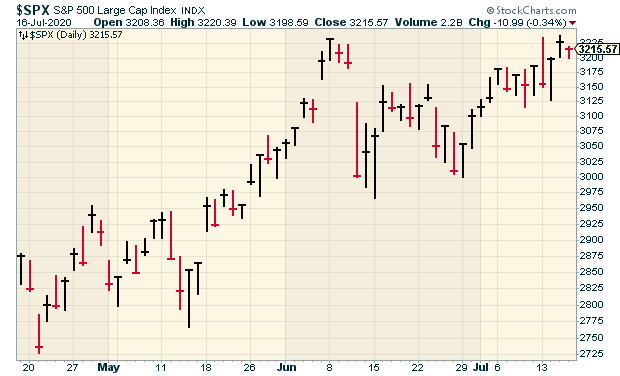
Since the start of this year, Wall Street has cut its estimate for Q2 earnings in half. The stock market, however, has held up much better, which suggests it sees this as a temporary problem. In fact, the S&P 500 recently got to a five-week high, and it’s not far from a four-month high.
We’ll also get the first of our Buy List earnings reports next week. Four reports are due on Wednesday and we’ll get another three on Thursday. I’m not expecting stellar results this season. Instead, I’m more concerned about how well our companies are managing themselves through this difficult time and I want to hear any guidance for the rest of this year.
Next Week’s Buy List Earnings Reports
Over the next three weeks, 22 of our 25 Buy List stocks will report their earnings results. Here’s an Earnings Calendar. I’ve listed each stock along with its earnings date and Wall Street’s current estimate.
Company Ticker Date Estimate Result Check Point Software CHKP 22-Jul $1.43 Globe Life GL 22-Jul $1.58 Silgan SLGN 22-Jul $0.64 Stepan SCL 22-Jul $1.20 Danaher DHR 23-Jul $1.08 Eagle Bancorp EGBN 23-Jul $0.74 Hershey HSY 23-Jul $1.15 RPM International RPM 27-Jul $1.01 AFLAC AFL 28-Jul $1.06 Sherwin-Williams SHW 28-Jul $5.77 Cerner CERN 29-Jul $0.61 Intercontinental Exchange ICE 30-Jul $1.05 Stryker SYK 30-Jul $0.57 Church & Dwight CHD 31-Jul $0.63 Trex TREX 3-Aug $0.62 Disney DIS 4-Aug -$0.63 Ansys ANSS 5-Aug $1.16 Fiserv FISV 5-Aug $0.93 Becton, Dickinson BDX 6-Aug $2.06 Broadridge Financial Solutions BR 11-Aug $2.08 Middleby MIDD TBA $0.39 Moody’s MCO TBA $2.15 One footnote. RPM International (RPM) is one of our “off-cycle” stocks. RPM’s fiscal Q4 ended in May. With their Q4 reports, companies are allowed a little more time. That’s why RPM is reporting in July.
Seven of our Buy List stocks are due to report next week. The first four report on Wednesday.
Check Point Software (CHKP) got my attention in its last earnings report when it said that it had seen an uptick in cyber-attacks since the coronavirus made landfall. For Q1, the cyber-security firm earned $1.42 per share, which beat the Street by four cents.
The stock recently ran off a streak of closing higher nine days in a row (see the chart below). The share price has sailed above our Buy Below price, and it’s close to a new 52-week high. I’ll probably adjust it next week, but I want to see the earnings results first. It’s never a good strategy to chase after a stock. For Q2, Wall Street expects earnings of $1.43 per share.
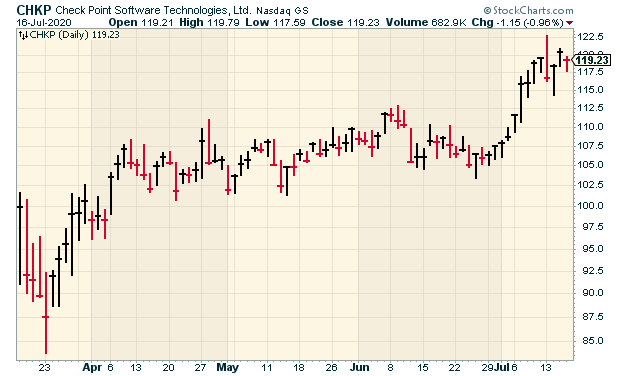
Our three financial stocks are our three worst performers this year. Globe Life (GL) has been the least bad of the three. Shares of Globe Life not only lagged the market through the nasty bear months, but also has lagged during the rally.
Three months ago, GL had a pretty good earnings report. It beat earnings by two cents per share. At the time, the insurance company cut its full-year guidance. The original range was $7.03 to $7.23 per share. Globe Life cut that to a range of $6.65 and $7.15. Honestly, that’s not that bad. If Globe Life’s guidance is close to being correct, that means the stock is going for about 11 times this year’s earnings. Don’t throw in the towel on Globe Life.
Silgan Holdings (SLGN) is one of our new stocks this year, and it’s gotten off to a good start for us. SLGN has been trending upward lately. Through Thursday, Silgan is up close to 10% for us this year.
In April, the metal-container company had a pretty good earnings report. For Q2, Silgan sees earnings between 55 and 70 cents per share. That’s a pretty wide range. Wall Street expects 64 cents per share, which is almost certainly too low.
For the whole year, Silgan estimates earnings will range between $2.30 and $2.50 per share. That’s an increase from the previous range of $2.28 to $2.38 per share. Not many companies have raised guidance in this environment. I’m expecting good news from Silgan.
Three months ago, Stepan (SCL) reported Q1 earnings of $1.04 per share. That easily beat Wall Street’s consensus of 78 cents per share. I should add that Stepan is only followed by three analysts, so that’s not much of a consensus.
If you’re not familiar with Stepan, the company is a major manufacturer of specialty and intermediate chemicals that are used in a broad range of industries.
Although Stepan is classified with other specialty-chemical companies, it’s unique in the industry. Stepan doesn’t have a competitor or competitors to precisely match its businesses because its products have a specific focus. (Note this week’s epigraph.)
The CEO said that Stepan had a solid start to the year. Last quarter, Stepan paid out $6.2 million in dividends and bought back 260,605 shares for $7.2 million. The company has increased its dividend every year for 52 years. For Q2, the “consensus” is for earnings of $1.20 per share.
There are three more earnings reports on Thursday.
Danaher (DHR) is having another great year for us. Through Thursday, the stock is up over 23% this year. Earlier this year, Danaher closed its very big deal to buy GE’s biopharma business for $21.4 billion. That business is now called Cytiva. Last year, Danaher IPO’d Envista, its dental business. Wall Street expects earnings of $1.08 per share.
Eagle Bancorp (EGBN) has been one of our problem stocks this year. However, the earnings results have been fine. The problem is that Eagle’s legal bills have weighed on it. The important point is that the folks who caused the problems are no longer with Eagle.
Wall Street expects Q2 earnings of 74 cents per share which would be a big drop from the $1.06 per share Eagle earned in last year’s Q2. Even if Eagle’s earnings are a bust this year, the bank is currently going for 7.5 times last year’s earnings. The bank is not going out of business. It just needs to move past its scandal.
Last is Hershey (HSY). The chocolatier has badly lagged the market over the past three months. Part of that is simply because Hershey is a defensive stock. Much of the rally has been folks pouring out of defensive stocks and into tech shares.
I like Hershey, but I was disappointed with its last earnings report. Sales were flat, and earnings came in eight cents below the Street.
In January, the company said it expected full-year earnings between $6.13 and $6.24 per share. Hershey later withdrew that guidance, although the company said it stands by its long-run goal of growing EPS by 6% to 8%. For Q2, the consensus on Wall Street is for earnings of $1.15 per share.
Before I go, I want to make two adjustments to our Buy Below prices. Shares of Hormel Foods (HRL) have been improving lately. This week, I’m going to bump up our Buy Below price to $53 per share.
Shares of Ross Stores (ROST) have been sliding downward for the last few weeks. I think Ross may be one of the best bargains on our Buy List. I’m dropping our Buy Below to $92 per share. That’s not in any sense a downgrade. I simply want to the Buy Below to better reflect the current market environment.
That’s all for now. There’s not a lot in the way of economic reports next week. Most attention will be on earnings. On Wednesday, the existing-home sales report is due out. On Thursday, we’ll get another jobless-claims report. The last 17 in a row have topped one million. On Friday, the report on new homes is due out. Be sure to keep checking the blog for daily updates. I’ll have more market analysis for you in the next issue of CWS Market Review!
– Eddy
Morning News: July 17, 2020
Eddy Elfenbein, July 17th, 2020 at 7:03 amWhere Did All The Bulls Go? Rallies Stall As EU Summit Begins
Coronavirus Surge, Renewed Lockdowns Fan Fresh Worries About Global Fuel Demand
The U.S. Set Up These Programs to Offset Covid Hardship. They’re All About to Expire
Consumers Came Back in June, but for How Long?
For Owners of Century-Old Businesses, Shutting Down Brings a Special Pain
Mortgage Rates Drop Below 3% for First Time, Tempting Home Buyers
Twitter Struggles to Unpack a Hack Within Its Walls
Netflix Stock Tumbles as the Covid Subscriber Boom Comes to an End
British Airways Is Grounding Its Fleet of 747 Jets for Good
‘Let’s Go Fly, for God’s Sake.’ Behind American Airlines Chief’s All-In Strategy
German Finance Minister Knew of Wirecard Issues a Year Before Collapse
Voices From Travel’s Frontlines: ‘We Walk in Fear, We Work in Fear’
Ben Carlson: The Greatest Danger Investors Face
Howard Lindzon: Ultimate Freedom
Jeff Carter: $300 Billion; 51 Million Students
Be sure to follow me on Twitter.
-
-
Archives
- March 2025
- February 2025
- January 2025
- December 2024
- November 2024
- October 2024
- September 2024
- August 2024
- July 2024
- June 2024
- May 2024
- April 2024
- March 2024
- February 2024
- January 2024
- December 2023
- November 2023
- October 2023
- September 2023
- August 2023
- July 2023
- June 2023
- May 2023
- April 2023
- March 2023
- February 2023
- January 2023
- December 2022
- November 2022
- October 2022
- September 2022
- August 2022
- July 2022
- June 2022
- May 2022
- April 2022
- March 2022
- February 2022
- January 2022
- December 2021
- November 2021
- October 2021
- September 2021
- August 2021
- July 2021
- June 2021
- May 2021
- April 2021
- March 2021
- February 2021
- January 2021
- December 2020
- November 2020
- October 2020
- September 2020
- August 2020
- July 2020
- June 2020
- May 2020
- April 2020
- March 2020
- February 2020
- January 2020
- December 2019
- November 2019
- October 2019
- September 2019
- August 2019
- July 2019
- June 2019
- May 2019
- April 2019
- March 2019
- February 2019
- January 2019
- December 2018
- November 2018
- October 2018
- September 2018
- August 2018
- July 2018
- June 2018
- May 2018
- April 2018
- March 2018
- February 2018
- January 2018
- December 2017
- November 2017
- October 2017
- September 2017
- August 2017
- July 2017
- June 2017
- May 2017
- April 2017
- March 2017
- February 2017
- January 2017
- December 2016
- November 2016
- October 2016
- September 2016
- August 2016
- July 2016
- June 2016
- May 2016
- April 2016
- March 2016
- February 2016
- January 2016
- December 2015
- November 2015
- October 2015
- September 2015
- August 2015
- July 2015
- June 2015
- May 2015
- April 2015
- March 2015
- February 2015
- January 2015
- December 2014
- November 2014
- October 2014
- September 2014
- August 2014
- July 2014
- June 2014
- May 2014
- April 2014
- March 2014
- February 2014
- January 2014
- December 2013
- November 2013
- October 2013
- September 2013
- August 2013
- July 2013
- June 2013
- May 2013
- April 2013
- March 2013
- February 2013
- January 2013
- December 2012
- November 2012
- October 2012
- September 2012
- August 2012
- July 2012
- June 2012
- May 2012
- April 2012
- March 2012
- February 2012
- January 2012
- December 2011
- November 2011
- October 2011
- September 2011
- August 2011
- July 2011
- June 2011
- May 2011
- April 2011
- March 2011
- February 2011
- January 2011
- December 2010
- November 2010
- October 2010
- September 2010
- August 2010
- July 2010
- June 2010
- May 2010
- April 2010
- March 2010
- February 2010
- January 2010
- December 2009
- November 2009
- October 2009
- September 2009
- August 2009
- July 2009
- June 2009
- May 2009
- April 2009
- March 2009
- February 2009
- January 2009
- December 2008
- November 2008
- October 2008
- September 2008
- August 2008
- July 2008
- June 2008
- May 2008
- April 2008
- March 2008
- February 2008
- January 2008
- December 2007
- November 2007
- October 2007
- September 2007
- August 2007
- July 2007
- June 2007
- May 2007
- April 2007
- March 2007
- February 2007
- January 2007
- December 2006
- November 2006
- October 2006
- September 2006
- August 2006
- July 2006
- June 2006
- May 2006
- April 2006
- March 2006
- February 2006
- January 2006
- December 2005
- November 2005
- October 2005
- September 2005
- August 2005
- July 2005
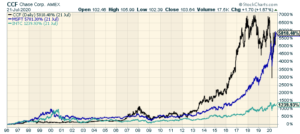
 Eddy Elfenbein is a Washington, DC-based speaker, portfolio manager and editor of the blog Crossing Wall Street. His
Eddy Elfenbein is a Washington, DC-based speaker, portfolio manager and editor of the blog Crossing Wall Street. His